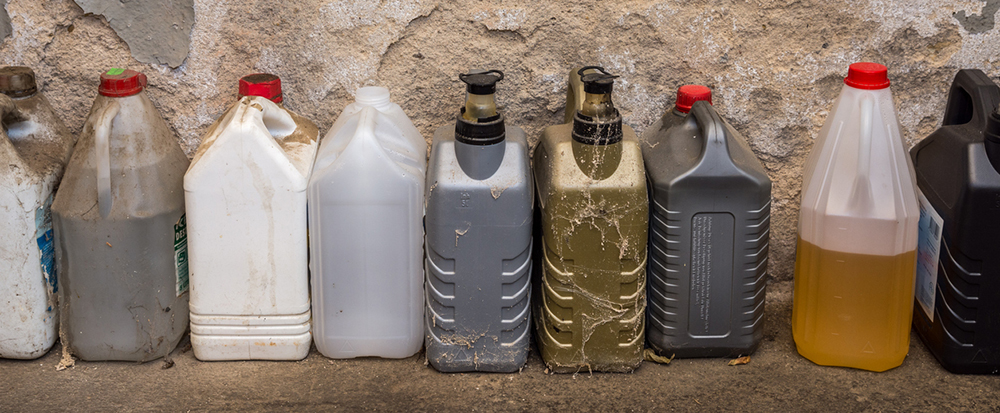Used DEF Containers – How to Avoid SCR System Contamination

Used DEF Containers
Why Used DEF Containers Are One-Time Use Vessels
“Whatever you do, do not leave used DEF containers lying around empty… throw them away, replace them or recycle them,” says subject matter expert, Robert Santich – North American Managing Director for Top!Blue USA. “Not disposing of or recycling your used DEF containers causes huge problems with contamination. Unfortunately, I see it all the time, and the only way to get around making these mistakes is to educate your team about the risks of contamination on an ongoing basis.” Diesel exhaust fluid, or DEF, is an aqueous solution comprised of 32.5% urea and 67.5% de-ionized water. It is considered to be a non-hazardous substance. DEF was developed for diesel engines made in the year 2010 and later, and is used in the selective catalytic reduction systems (SCRs) as an additive to reduce the amount of harmful NOx emissions in the form of particulate matter being released into the atmosphere. SCR systems are emissions control technology devices that are highly sensitive to the presence of fluorocarbons within a vehicle’s exhaust stream. When DEF – a liquid reductant that is injected into the exhaust stream – becomes contaminated by a different type of fuel or fluid, you’re looking at some major mechanical problems, costly cleanup and the potential for full catastrophic engine failure.
Avoid the Worst Case Scenario
Consider the following: You grab a seemingly empty used DEF containers and fill them with diesel. These jugs eventually get refilled with DEF, are then poured into your SCR system. You drive off and the DEF light switches on almost immediately as it detects the presence of fluorocarbons and noxious emissions such as nitrogen. Your engine shuts down, allowing you to limp along at 5mph, but in the end your rig requires a tow. Because of your mistake, the entire DEF pump needs to be replaced, along with the tank, the filter, and all associated tubing. You’re lucky that the engine shut down before the contaminated DEF reached all the way into your injectors, which would have caused catastrophic damage and the cost of repairs to double, if not triple.
The Cost of an Innocent Mistake
As it stands, you’re looking at around $4,000 in repairs, not to mention the additional loss of revenue from engine downtime for a critical piece of your fleet. If you continued to run your engine, the cost would have gone from $4k to $8k, even as high as $15k… all for a simple, avoidable mistake. Don’t reuse your used DEF containers! Why does your SCR system need to be entirely replaced? Because rubber and plastic components are porous and they will absorb, even in trace amounts whatever foreign fluid, such as diesel fluid that you may have run through the system. According to Santich, “That situation happens more than you can possibly imagine because people don’t want to throw away the jugs so that they can re-use them as gas cans.”
Used DEF Containers – One Time Use Only
By mixing DEF and diesel in the same container, you contaminate your entire SCR system – a highly sensitive, sophisticated emissions control technology that has zero tolerance for NOx atmospheric pollutants. DEF jugs and containers are one-time use vessels. Period. They need to either be thrown away, recycled or replaced. They cannot be cleaned using chemicals or products such as nitrogen fertilizer, and the one safe exception – deionized water (DI water) is not advised. The risk of contamination is too high, so Santich recommends properly disposing of all DEF jugs in accordance with state and regional environmental regulations to avoid possible re-use and subsequent contamination. Says Santich, “New DEF drums, jugs and totes are closed and clean upon arrival and the transfer of fluids should be done using clean equipment and processes that eliminate contamination from air, dirt, debris, etc. When we refill a tote onsite, if it has been used 4-5 times over a 6-month period it needs to be switched out because of the dirty ambient air that has been drawn in over time. Most companies don’t replace their totes as frequently as they should, which can also compromise the integrity of their DEF.”
The Bottom Line
Education is the key to preventing the costly and potentially catastrophic mistake described above. Don’t let this kind of worse case scenario happen to you and your fleet. And although it may seem like a no-brainer, it is also important to educate your team about the repercussions of mixing up your diesel fuel gas cap with your DEF cap. Believe it or not, someone somewhere actually managed to hold the diesel nozzle in such a way that they were able to pour fuel directly into the DEF tank, despite the fact that the openings are two different sizes. Innocent mistakes like that can cost a fortune to remedy, so revisit these topics often with your team, making sure that everyone is on the same page.
Contact an SCL Consultant Today
In a wide range of industrial sectors, SCL is committed to being the number one logistics and solutions provider for the products that protect and optimize the machines that keep our country moving. We pride ourselves on remaining at the forefront of industry trends and technological innovations, and as the market continues to evolve, we are committed to providing extensive product and industry knowledge and total performance satisfaction for our customers. For information on how we can assist your fleet in choosing the optimal products at a competitive price, contact an SCL consultant today.
